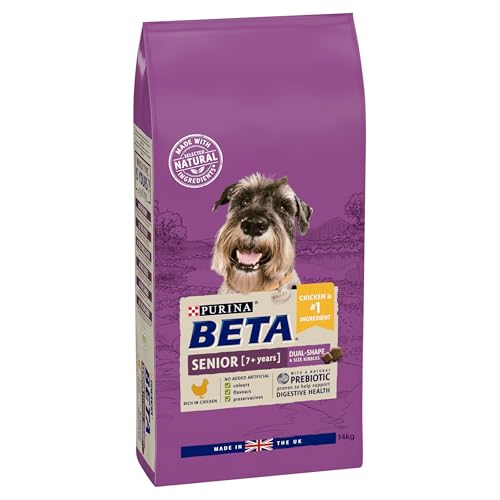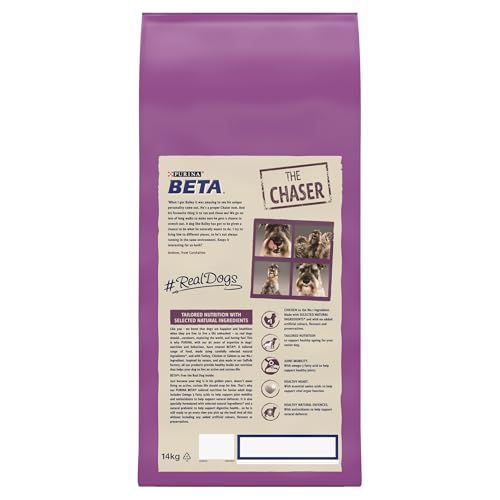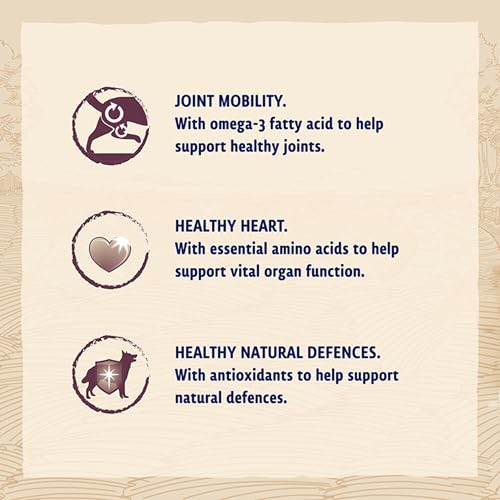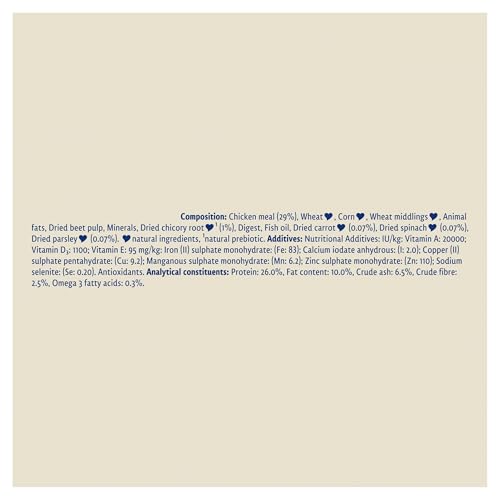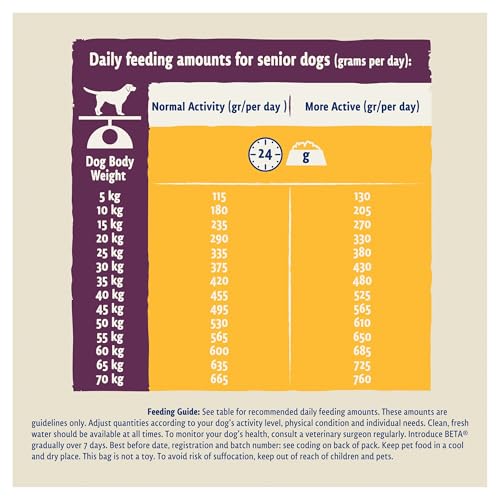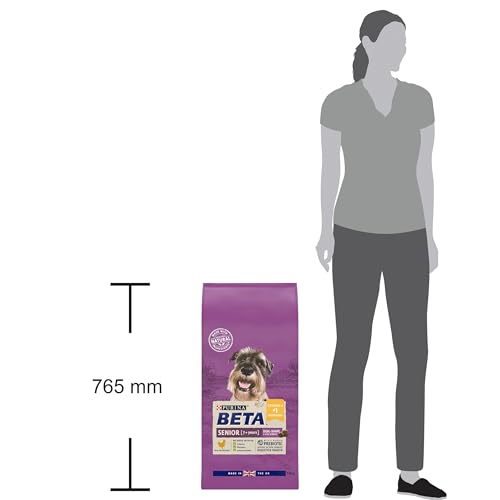
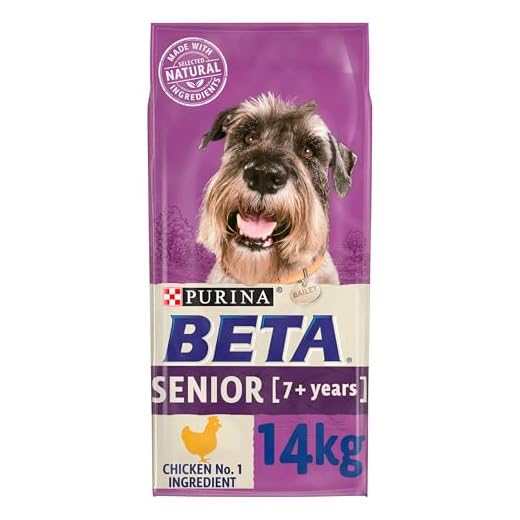



As a dedicated dog owner, I’ve always been keen on providing my furry friend with the best possible care. When my energetic Labrador, Max, started to show signs of ageing, I knew it was time to reevaluate his diet. Active senior dogs have unique nutritional needs that differ significantly from those of younger dogs or less active seniors. The right diet can make a world of difference in their health, energy levels, and overall quality of life.
After extensive research and consultations with veterinarians, I discovered that selecting the best dog food for active senior dogs is more than just choosing any senior dog formula. It involves a careful balance of protein, fats, and essential nutrients to support their ageing joints, maintain muscle mass, and keep their energy levels up. Additionally, it’s crucial to consider ingredients that aid digestion and promote a healthy immune system, which becomes increasingly important as dogs age.
In this article, I’ll share my findings on the top dog food options tailored specifically for active senior dogs. Whether you’re dealing with a spirited Golden Retriever or a lively Border Collie, the right food can help them stay vibrant and healthy in their golden years. Join me as we explore the best choices to keep your senior dog thriving and full of life.
Understanding the Nutritional Needs of Senior Dogs
As our furry friends age, their dietary requirements evolve significantly. I’ve learned that feeding an older, active dog isn’t just about reducing calories or managing weight. It’s crucial to consider a balanced diet that supports their overall health, mobility, and energy levels.
One important aspect is protein. Older dogs need high-quality protein to maintain muscle mass and support their aging bodies. Contrary to some outdated advice, reducing protein intake for seniors is not beneficial; instead, ensuring it’s easily digestible and sourced from high-quality ingredients is key.
Key Nutritional Elements for Senior Dogs
Aside from protein, several other nutrients play vital roles in the well-being of an active senior dog. Here are some essential components:
- Fatty Acids: Omega-3 and Omega-6 fatty acids help maintain healthy skin and coat, and support joint health. These are particularly important for older dogs to keep them agile and comfortable.
- Fibre: Adequate fibre aids digestion and can help prevent constipation, a common issue in senior dogs. Fibre also promotes a healthy gut microbiome, which is crucial for overall health.
- Vitamins and Minerals: Senior dogs benefit from added vitamins and minerals that support immune function and prevent deficiencies. Calcium and phosphorus are important for bone health, while antioxidants like vitamins E and C support cellular health.
- Joint Supplements: Ingredients such as glucosamine and chondroitin are often included in senior dog foods to support joint health and mobility. These supplements can be particularly beneficial for maintaining an active lifestyle.
Feeding an older dog involves more than just selecting a senior formula; it requires understanding their unique needs and choosing a diet that supports their health and vitality. By prioritising high-quality ingredients and balanced nutrition, we can help our senior dogs enjoy their golden years to the fullest.
Key Ingredients to Look for in Senior Dog Food
As my dog has entered their golden years, I’ve realised the importance of choosing the right food to support their changing needs. Senior dogs, especially those who remain active, require a diet that helps maintain their energy levels while also addressing age-related health concerns. Understanding what to look for in their food can make a significant difference in their quality of life.
It’s crucial to ensure that the ingredients in my dog’s food are specifically tailored to promote joint health, support their immune system, and maintain a healthy weight. Here are some key components I always look for when selecting food for my senior dog:
Essential Ingredients for Senior Dog Nutrition
- High-Quality Protein: As dogs age, their muscle mass tends to decrease. Protein helps maintain muscle strength and energy. I look for foods with high-quality, easily digestible protein sources like chicken, turkey, or fish.
- Omega-3 Fatty Acids: Ingredients like fish oil and flaxseed are rich in omega-3 fatty acids, which are essential for reducing inflammation and supporting joint health. This is particularly important for senior dogs who may suffer from arthritis or other joint issues.
- Antioxidants: To boost my dog’s immune system, I choose foods rich in antioxidants. Ingredients such as blueberries, spinach, and carrots provide the necessary vitamins and minerals to help combat free radicals and support overall health.
- Fibre: Digestive health can be a concern for older dogs. Ingredients like sweet potatoes, pumpkin, and brown rice provide the fibre necessary to promote healthy digestion and regular bowel movements.
- Glucosamine and Chondroitin: These compounds are vital for joint health. They help to maintain the integrity of cartilage, ensuring that my dog’s joints remain flexible and pain-free.
- Limited Calories: To prevent weight gain, I opt for foods that are lower in calories but still nutrient-dense. Ingredients that provide balanced nutrition without excess calories help my dog stay fit and active.
By focusing on these specific ingredients, I can ensure that my senior dog gets the nutrition they need to stay healthy and active. It’s all about providing them with a balanced diet that addresses their unique needs as they age.
Best Dog Food Brands for Active Senior Dogs
As our furry friends age, their nutritional needs evolve, especially for those who remain active in their golden years. Choosing the right dog food is crucial to ensure they receive the necessary nutrients to support their energy levels, joint health, and overall well-being.
With countless options available, it can be challenging to find the perfect fit. Here, I will share my top recommendations for dog food brands that cater specifically to the needs of active senior dogs.
- Hill’s Science Diet – Renowned for its scientifically formulated recipes, Hill’s Science Diet offers a senior dog food that includes a balanced blend of nutrients. It’s particularly beneficial for maintaining healthy joints and muscles, ensuring that your senior dog stays active and agile.
- Blue Buffalo Life Protection Formula – This brand focuses on high-quality ingredients, with real meat as the first ingredient. Blue Buffalo’s senior formula includes glucosamine and chondroitin, which are essential for joint health, along with antioxidants for immune support.
- Nutro Ultra Senior – Nutro Ultra provides a unique blend of superfoods, lean proteins, and whole grains tailored for senior dogs. This recipe promotes overall vitality, supports healthy digestion, and keeps your senior dog energetic and lively.
- Wellness Complete Health Senior – Wellness offers a complete and balanced diet designed for senior dogs. This formula includes added fibre for digestion, as well as vitamins and minerals to support heart and eye health, making it ideal for older dogs who still enjoy an active lifestyle.
- Orijen Senior – Known for its biologically appropriate recipes, Orijen Senior is rich in protein and incorporates a variety of meats. This diet is perfect for maintaining lean muscle mass and supporting joint health, ensuring that your senior dog remains robust and full of life.
Each of these brands brings something unique to the table, but all share a commitment to high-quality, nutritious ingredients that cater to the needs of active senior dogs. By choosing one of these options, you can help ensure that your beloved pet continues to enjoy their golden years with vitality and vigour.
How to Transition Your Dog to Food for Older, Active Canines
As my dog began to show signs of ageing, I realised it was time to switch his diet to something more suitable for his senior years. The change wasn’t just about choosing a different bag of kibble; it involved a careful process to ensure his health and activity levels remained optimal.
Transitioning your dog to a new diet designed for older, active dogs can seem daunting, but with a methodical approach, it can be done smoothly. The key is to make the change gradually to avoid digestive issues and to monitor your dog’s response to the new food.
Steps to Transition Your Dog’s Diet
Here’s how I managed to transition my dog to senior dog food:
- Introduce Gradually: Begin by mixing a small amount of the new food with your dog’s current food. I started with a ratio of 25% new food and 75% old food.
- Increase Proportion: Over the course of a week, gradually increase the proportion of the new food while decreasing the old one. I shifted to 50/50 after a few days, then 75/25, and finally to 100% new food.
- Monitor Digestive Health: Keep a close eye on your dog’s stool and overall behaviour. Any signs of digestive distress, such as diarrhoea or vomiting, may indicate that you need to slow down the transition.
- Adjust According to Needs: Not all dogs adjust at the same pace. Some might need more time to adapt to the new diet, so it’s important to be patient and adjust the transition timeline if necessary.
Throughout this process, I also kept in regular contact with my veterinarian. Their guidance was invaluable in ensuring that my dog’s nutritional needs were being met and that the transition was going as smoothly as possible. It’s crucial to consider that senior dogs often have different dietary requirements, such as higher fibre content for better digestion and specific nutrients to support joint health.
By taking a gradual and attentive approach, I was able to successfully transition my dog to his new senior diet, ensuring he remained healthy and active in his golden years. This careful transition not only benefited his physical health but also contributed to his overall wellbeing, allowing him to continue enjoying his favourite activities with the same enthusiasm.
Homemade Dog Food Recipes for Active Senior Dogs
Caring for an energetic senior dog means providing them with the right nutrition to support their vitality and health. As my own dog aged, I realised the importance of a diet tailored to their changing needs. Homemade meals have given me the ability to control the ingredients and ensure they receive the nutrients essential for their wellbeing.
Preparing food at home allows me to use fresh, high-quality ingredients and avoid preservatives found in many commercial dog foods. It’s been a rewarding experience to see the positive impact on my dog’s energy levels and overall health. Here are some recipes that have worked wonders for my active senior dog.
Nutritious Homemade Recipes
-
Chicken and Vegetable Medley
- 2 cups of diced chicken breast
- 1 cup of chopped carrots
- 1 cup of green beans
- 1/2 cup of brown rice
- 1 tablespoon of olive oil
Cook the chicken thoroughly and set aside. Steam the vegetables until tender. Cook the brown rice as per package instructions. Combine all ingredients and add the olive oil for a healthy fat boost. This meal is rich in protein and fibre, supporting muscle maintenance and digestive health.
-
Beef and Sweet Potato Delight
- 1 cup of ground beef
- 1 large sweet potato, peeled and cubed
- 1/2 cup of peas
- 1/2 cup of quinoa
- 1 teaspoon of fish oil
Brown the ground beef and drain any excess fat. Boil the sweet potato until soft. Cook the quinoa as directed. Mix all ingredients together and add the fish oil for an omega-3 boost, which is excellent for joint health and a shiny coat.
-
Turkey and Spinach Feast
- 2 cups of ground turkey
- 1 cup of spinach, chopped
- 1/2 cup of carrots, grated
- 1/2 cup of oatmeal
- 1 tablespoon of coconut oil
Cook the ground turkey and drain off any fat. Lightly steam the spinach and carrots. Prepare the oatmeal according to package instructions. Combine all ingredients and incorporate the coconut oil for additional energy and skin health benefits.
These recipes provide balanced nutrition tailored to the needs of senior dogs, helping them stay active and healthy. By including a variety of protein sources, vegetables, and healthy fats, you can ensure your senior dog enjoys their meals and maintains their zest for life.
Advantages of a Protein-Rich Diet for Elderly Dogs
As our furry companions age, their dietary needs evolve. One significant change is the necessity for increased protein intake. For senior dogs, especially those that remain active, a protein-rich diet can provide numerous health benefits that contribute to their overall well-being.
Proteins are the building blocks of life, essential for maintaining muscle mass and supporting vital bodily functions. For senior dogs, a diet high in quality proteins can help preserve lean muscle tissue, which tends to diminish with age. This is particularly important for active senior dogs who require strong muscles to continue enjoying their favourite activities.
Key Benefits of High-Protein Diets
- Muscle Maintenance: High-quality protein supports the retention of muscle mass. As dogs age, they naturally lose muscle, but a diet rich in protein can slow this process, keeping them stronger and more active for longer.
- Enhanced Energy Levels: Proteins provide a sustained energy source. For senior dogs that remain active, this energy is crucial for maintaining their endurance and vitality during walks, playtime, and other activities.
- Better Immune Function: Proteins are vital for the production of antibodies and other components of the immune system. A protein-rich diet helps bolster a senior dog’s immune response, making them more resilient to illnesses.
- Improved Skin and Coat Health: High-protein diets can enhance the health of a dog’s skin and coat. Essential amino acids found in proteins promote healthy skin and a shiny, thick coat, which are indicators of a well-balanced diet.
Moreover, it’s important to select high-quality protein sources such as chicken, fish, or lamb. These sources are not only easier to digest for older dogs but also offer a balanced amino acid profile, which is crucial for their overall health.
In conclusion, a protein-rich diet is a key factor in supporting the health and longevity of active senior dogs. By ensuring their diet includes ample high-quality protein, we can help them maintain their muscle mass, energy levels, immune function, and skin and coat health, allowing them to enjoy their golden years to the fullest.
Common Dietary Issues in Senior Dogs and How to Address Them
As our canine companions age, their dietary needs and challenges evolve significantly. Active senior dogs often face a range of nutritional issues that can impact their overall health and vitality. Being aware of these common dietary concerns and knowing how to address them is crucial in maintaining the well-being of our older furry friends.
One prevalent issue in senior dogs is the development of digestive problems. As dogs get older, their digestive systems can become less efficient, leading to issues like constipation, diarrhoea, or general gastrointestinal discomfort. This can be particularly concerning for active senior dogs who require consistent energy and nutrient absorption to maintain their activity levels.
Addressing Common Nutritional Problems in Senior Dogs
To mitigate digestive issues in senior dogs, it’s essential to provide a diet that is easily digestible and rich in fibre. High-quality dog foods designed for senior dogs typically include ingredients that support digestive health, such as prebiotics and probiotics. These components help maintain a healthy gut flora, which is crucial for proper digestion and nutrient absorption.
Another frequent concern is the risk of obesity. Senior dogs are often less active than their younger counterparts, which can lead to weight gain if their caloric intake isn’t appropriately adjusted. Excess weight can exacerbate joint problems and decrease a dog’s mobility, significantly affecting their quality of life.
To manage weight, it’s important to choose a dog food with a balanced calorie content and to monitor portion sizes carefully. Incorporating regular exercise tailored to the dog’s abilities also plays a vital role in maintaining a healthy weight. Look for dog foods that offer a balance of protein and healthy fats while being mindful of calorie density.
Furthermore, senior dogs may experience dental issues, such as tooth decay and gum disease, which can make eating difficult and painful. This can lead to a decrease in appetite and subsequent nutritional deficiencies.
To support dental health, consider feeding your dog food that promotes oral hygiene. Dry kibble can help reduce plaque buildup, while certain treats and toys are designed to clean teeth and massage gums. For dogs with severe dental problems, wet food or specially formulated soft kibble might be more appropriate.
Lastly, it’s crucial to ensure that senior dogs receive adequate levels of essential nutrients like vitamins, minerals, and antioxidants. These nutrients support overall health, immune function, and can help mitigate the effects of ageing.
- Choose a senior dog food formulated with a comprehensive nutrient profile.
- Incorporate supplements as recommended by a veterinarian, such as glucosamine for joint health or omega-3 fatty acids for skin and coat condition.
- Regularly consult with your veterinarian to adjust dietary needs based on health changes.
By being proactive and attentive to the specific dietary needs of our senior dogs, we can help them maintain their health and continue to enjoy their golden years with vitality.
Supplements Enhancing Senior Dog Vitality
As a devoted owner of an active senior dog, I understand the significance of ensuring my companion’s well-being. To support my dog’s health and vitality, I incorporate a range of carefully selected supplements into their diet. These additions are tailored to address the specific needs that arise with age, helping to maintain their active lifestyle for years to come.
Joint Support Formulas
One of the primary concerns for senior dogs, especially those who lead active lives, is joint health. To alleviate any discomfort and promote mobility, I include supplements rich in glucosamine and chondroitin. These compounds assist in maintaining cartilage health, reducing inflammation, and supporting overall joint function. Additionally, omega-3 fatty acids sourced from fish oil provide further relief from stiffness and support joint flexibility.
- Glucosamine and Chondroitin: Vital for cartilage health, reducing inflammation, and supporting joint function.
- Fish Oil: Rich in omega-3 fatty acids to alleviate stiffness and promote joint flexibility.
By incorporating these supplements into my senior dog’s diet, I ensure they can continue to enjoy their favourite activities without discomfort or limitation. Monitoring their mobility and comfort levels allows me to adjust the dosage and combination of supplements as needed, ensuring they receive optimal support throughout their golden years.
Veterinarian Recommendations for Senior Dog Nutrition
When it comes to ensuring your active senior dog receives the best nutrition, veterinarians offer invaluable insights. Here are their top recommendations:
1. Balanced Diet: Veterinarians emphasize the importance of a balanced diet tailored to the needs of senior dogs. This should include high-quality protein, healthy fats, essential vitamins, and minerals.
- Lean protein sources such as chicken, fish, and turkey are ideal for maintaining muscle mass and energy levels.
- Healthy fats, like omega-3 fatty acids from fish oil, support joint health and cognitive function.
- Antioxidant-rich fruits and vegetables provide essential vitamins and minerals to support overall health and immunity.
2. Regular Veterinary Check-ups: Regular visits to the veterinarian are crucial for monitoring your senior dog’s health and nutritional needs. Veterinarians can assess your dog’s body condition, recommend appropriate dietary adjustments, and address any age-related health concerns.
By following these veterinarian recommendations and choosing the best dog food for your active senior dog, you can help support their health, vitality, and overall well-being in their golden years.
Best Dog Food For Active Senior Dogs
Features
| Part Number | 29046 |
| Model | 02SKFTLS |
| Warranty | 1 year manufacturer |
| Size | 1 count (Pack of 1) |
| Language | English |
| Price history for Skinner’s Field & Trial Light Dry Dog Food | |
|---|---|
|
Latest updates:
|
|
Features
| Part Number | 12231689 |
| Model | 12531980 |
| Color | transparent |
| Release Date | 2014-05-23T00:00:01Z |
| Size | 1 count (Pack of 1) |
Features
| Part Number | FTC15 |
| Model | 02SKFTC |
| Is Adult Product | |
| Release Date | 2011-04-14T00:00:01Z |
| Size | 15 kg (Pack of 1) |
| Language | English |
Features
| Is Adult Product | |
| Release Date | 2025-05-17T00:00:01Z |
| Language | English |
| Number Of Pages | 213 |
| Publication Date | 2025-05-17T00:00:01Z |
Features
| Part Number | 10753 |
| Model | 10753 |
| Size | 10 kg (Pack of 1) |
| Language | French |
Features
| Part Number | 5060084772250 |
| Model | 5060084772250 |
| Warranty | 1 year manufacturer |
| Color | red |
| Size | 12 kg (Pack of 1) |
| Language | English |
| Price history for Burns Hypoallergenic Dog Food | |
|---|---|
|
Latest updates:
|
|
Features
| Part Number | 0000 |
| Model | 0000 |
| Warranty | 45-day money back promise |
| Size | Single Pack |
| Energy Efficiency Class | A |
Features
| Size | 300 g (Pack of 1) |
Q&A:
What should I look for in dog food for active senior dogs?
Look for dog foods that are specifically formulated for senior dogs and contain high-quality protein, joint-supporting ingredients like glucosamine and chondroitin, and omega-3 fatty acids for cognitive health.
How important is protein content in dog food for active senior dogs?
Protein is crucial for maintaining muscle mass and supporting overall health in senior dogs, especially those who are active. Look for dog foods with a moderate to high protein content sourced from quality meat.
Are there any ingredients I should avoid in dog food for active senior dogs?
Avoid dog foods with excessive fillers, artificial preservatives, and low-quality meat by-products. Additionally, steer clear of foods with high levels of carbohydrates, which can lead to weight gain and decreased energy levels in senior dogs.
Should I consider special formulations like senior-specific dog food for my active senior dog?
Yes, senior-specific dog food formulations are tailored to meet the unique nutritional needs of older dogs, including joint support, cognitive health, and digestive health. These formulations can help keep your active senior dog healthy and thriving.
How can I ensure my active senior dog maintains a healthy weight?
Monitor your dog’s calorie intake and adjust their food portions accordingly to prevent weight gain or loss. Additionally, ensure they get regular exercise appropriate for their age and activity level, and choose dog foods with balanced nutrition to support their energy needs without excess calories.






